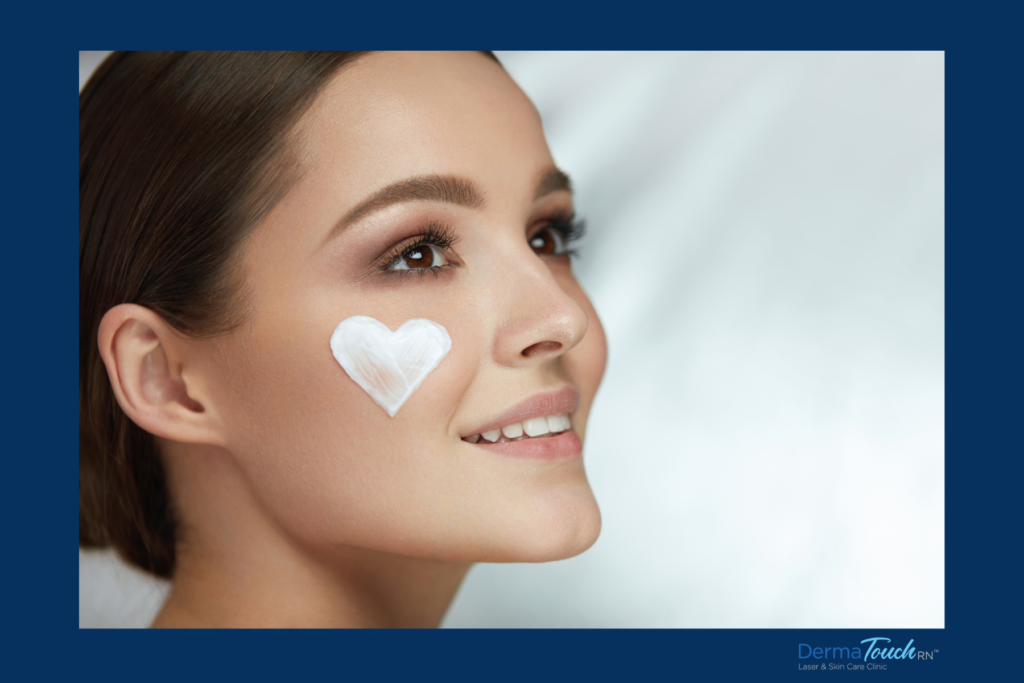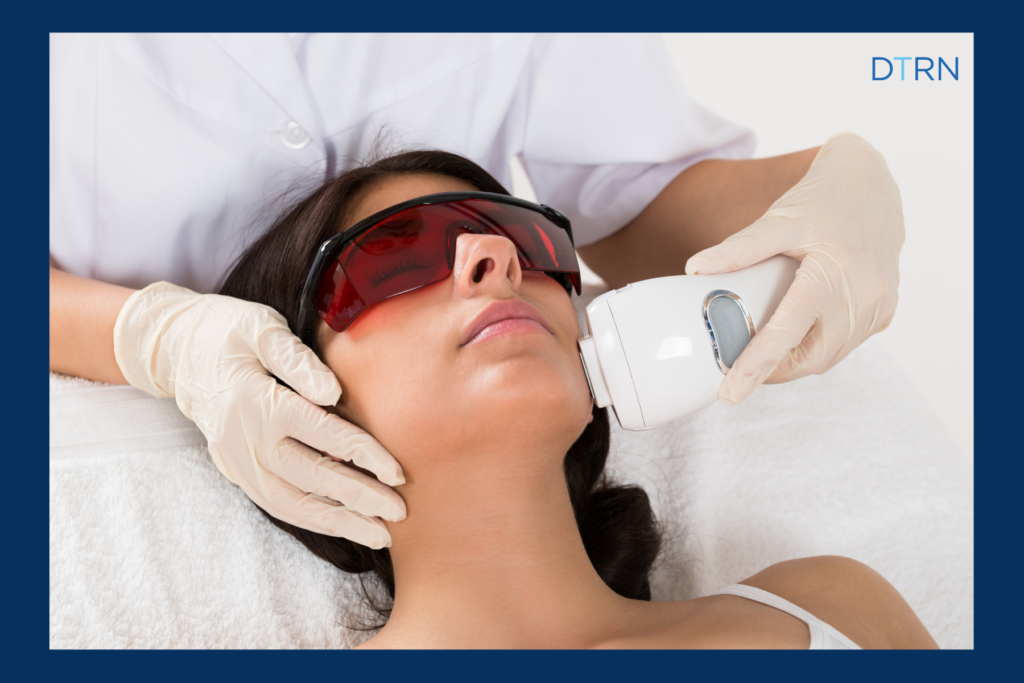In today’s post, we’re going to share how to prevent and repair sun damaged skin, including how to identify and prevent skin cancer. It’s important to pull together as a community to educate about skin care, including skin cancer and how to protect the skin from it.
We’re all born with baby skin that is soft and supple. After birth, depending on our biology and environmental factors we are exposed to, our skin will age at different rates. The better you take care of your skin early on, the healthier your skin will remain as you age. The sun causes some 90% of skin again per the Skin Cancer Foundation. The good news is, with the right measures, again caused by the sun can be prevented and treated.
Non-invasive laser treatments for sun damage to repair skin
At DermaTouch RN, we have a variety of treatments that can help repair sun damage, which can help prevent skin cancer in the future. For example, skin resurfacing with laser treatments is a great way to repair the skin, as well as induce collagen production to help the skin look healthier overall. In addition, the Skin Pen II treatment supports repairing the skin from sun damage. We also have great skin care products to prevent and treat sun damage, as well.
How can I prevent sun damage?
- Be cautious of the sun between 10 am and 3 pm. The sun’s rays are considered the strongest during this timeframe of the day.
- Wear sunscreen with at least an SPF 30. In addition to an SPF of 30, The American Academy of Dermatology suggests also finding a sunscreen that says “broad-spectrum” on it. You also want a sunscreen that is water-resistant. Reapply every 2 hours throughout the day and right after you swim or sweat.
- Wear protective clothing. Hats, long sleeves, and pants are all supportive in protecting your skin from the sun. They also sell sun protective clothing for those who spend long hours in the sun.
- Forgo the tanning bed. Some states have banned tanning beds for anyone under the age of 18 due to the harm they’re considered to cause. The ultraviolet rays emitted by tanning beds can damage your skin the same way the sun’s rays can when you don’t protect your skin.
How can I treat sun damage?
Continuing on with our list, if you’ve already gotten burnt or spent too much time in the sun and it shows on your skin, then you can take action to minimize the amount of damage caused.
- Purchase high-quality skin care products. Choose to wear a moisturizer with SPF in it to start, and then choose a regimen that is both preventative and reactive to help you minimize the appearance of aging. At DermaTouch RN, we offer top-of-the-line products from reputable companies like SkinMedica and Obagi to ensure our patients get the results they desire.
- Treat a burn right away. If you get a sunburn, then treat it right away with aloe vera gel (fresh from the plant is best) or a high-quality after-sun lotion.
- Seek out reputable cosmetic service facilities with microneedling and laser treatments for sun damage . Non-invasive cosmetic treatments, like laser light therapy (Halo, Moxi, BBL (Broadband Light), Profractional) and SkinPen II treatments, can do wonders to repair photo-aging and sun damage of the skin. We offer a variety of laser therapies and the SkinPen II treatment at DermaTouch RN.
It’s true that a little bit of sun is good for you, as the sun helps to activate certain cellular functions of the body, including the production of Vitamin D. At the same time, be wise and use caution as to not get burned. Doing so can help to prevent sun cancer and premature aging of the skin.
Preventing Skin Cancer
With summer officially behind us, many of us already are ready to reduce the signs of aging and ages spots the sun left behind “fun in the sun.” Per the Skin Cancer Foundation, there are more than 5 million non-melanoma skin cancer cases in the United States alone. Of that 5 million, 3 million people are treated. That’s a lot of people impacted by skin cancer! Fortunately, skin cancer is one of the most treatable and curable forms of cancer, and the earlier it’s caught, the better.

The ABCs of Skin Cancer
To help you identify skin cancer on your body, it’s important to do regular scans at least once a month. If you need, have someone you trust to look over your back, since it’s not as easy to access or see alone. As you scan your body, you want to look for any moles—flat or raised—that look suspicious or have changed in any way. Consider the following during your exam:
(A) Asymmetry – One side of the mole looks different than the other side.
(B) Border – The border of the mole is irregular in shape.
(C) Color – The color of the mole is not the same throughout.
(D) Diameter – The mole’s diameter is larger than 6mm.
(E) Evolving Size – The mole has changed color, size, or shape.
If any of the above is true for any of the moles on your body, make an appointment with your physician. Again, the sooner skin cancer is caught, the easier it is to cure, so don’t hesitate if you have any concerns at all.
DermaTouch RN offers laser treatments for sun damage
DermaTouch RN offers laser treatments for sun damage and more! Popular laser treatments for sun damage include the Halo, Moxi, BBL (Broadband Light), and Sciton Profractional. We also offer microneedling, radiofrequency microneedling, chemical peels, and advanced skincare treatments to treat and repair your skin, as well as prevent the signs of premature aging and sun damage.
Contact us today for a free consultation so we can have an honest discussion about the health of your skin and ways we can support you in treating sun damage or any of your skin care concerns. Book your San Antonio or Houston appointment or consultation online 24/7. Or, call 210.951.3520 (San Antonio) or 281.895.9090 (Houston) to schedule!
DermaTouch RN offers minimally invasive and non-invasive treatments for men and women in Houston, San Antonio, Spring and Cypress, as well as the surrounding areas of Texas. We are the largest aesthetic practice in the Houston area, and all of our medical spa treatments are performed by a team of nurse practitioners, registered nurses, and aestheticians who receive continuing education to remain abreast of emerging treatments that benefit our patients. We invite you to learn more about our office before your consultation.






